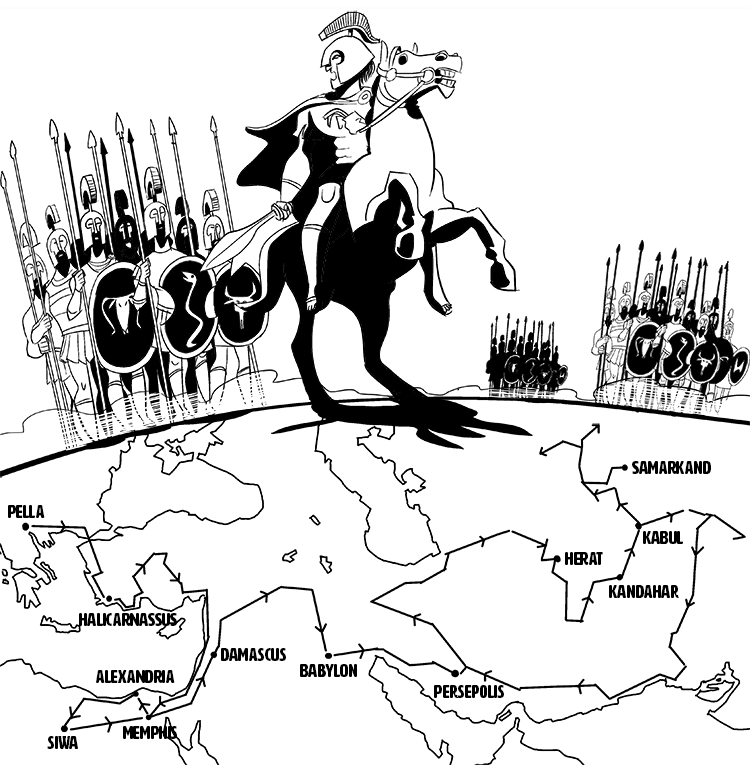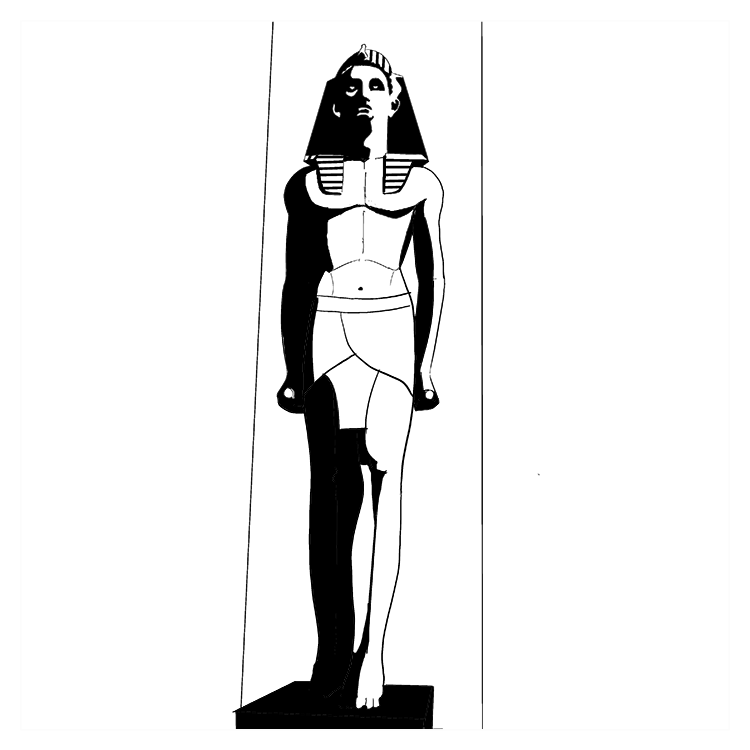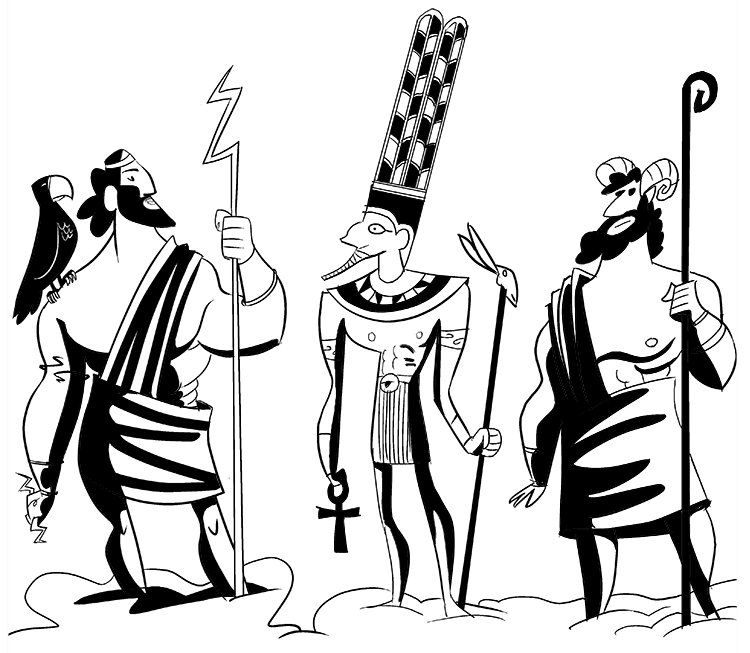The fertile lands along the banks of the Nile River helped Ancient Egypt grow into one of the most prosperous and powerful civilizations of the ancient world. But such success did not exist in a bubble. Also located along the shores of the Mediterranean Sea, Egypt caught the eyes of its many powerful neighbors.
First came the Persians from modern-day Iran. They took control of Egypt for nearly two centuries. But their efforts to dismantle Egyptian culture failed and created tremendous resentment.
Eventually, the Persians were removed by the Greeks. This conquest, however, was seen by the Egyptians as more of a liberation, and it opened the door for a new era of prosperity in Ancient Egypt.

Alexander’s Empire
Alexander dreamed of conquering the whole world, which to him meant Persia, Babylon, India, and beyond.
Greek Conquest of Egypt
In 333 BC, Egypt was under Persian rule. But the people of Egypt were not happy with this arrangement; they had been conquered just ten years prior for the second time in their history.
Repeated attempts at rebellion were pushed down, and it seemed as though the Egyptians had no choice but to accept their new position within the Persian Empire.
But seemingly out of nowhere, a young man named Alexander of Macedon — who would later be known as Alexander the Great — rose to the Macedonian throne. (Macedon was a kingdom in Northern Greece).
Soon after assuming his role, he set to work unifying the Greek world under the Kingdom of Macedon. But he was really just getting started.
Ambitious from a young age and made curious about the world by his tutor, Aristotle, he dreamed of conquering the whole world, which to him meant Persia, Babylon, India, and beyond.
But to do all this, he needed Egypt.
Taking Egypt from the Persians would not only weaken his enemy, but it would give him the perfect launching point for an invasion into Persia. So, in 333 BC, he sailed his army to the banks of the Nile Delta and confronted the Persians.
Political tensions in Persia prevented them from mounting a proper defense, and Alexander and his armies defeated them easily. The Persians made one counterattack, but this was beaten back.
Egypt had become Greek.

Alexander as Pharaoh
Alexander took the traditional title of “pharaoh” making it easier for the Egyptians to accept him.
The Five Point Plan
Because the Egyptians had not been all that thrilled with life under the Persians, they welcomed Alexander and his armies as liberators. But Alexander — perhaps because of his education — knew better than to rely too heavily on this gratitude. So he set out to solidify his rule.
This started with a peace plan that established Alexander as the Pharaoh of the Nile Delta. Taking the traditional Egyptian title of “pharaoh” helped to soften the reality that the Egyptians had been conquered, making it easier for them to accept him.
To symbolize this, Alexander held a coronation ceremony in which he placed the red and white crown of Egypt upon his head. While just a gesture, this showed his willingness to incorporate Egyptian customs to ensure a smooth conquest and win the love of the people.
In addition, Alexander agreed to marry one of the daughters of a powerful Egyptian ruler.
Beyond this, though, Alexander installed Greeks in nearly every important position of power in Egypt. But by taking all of these steps, he helped to win the favor of the Egyptians.
This set the tone for what life would be like in a Greek-ruled Egypt, but it also opened the door for both peace and prosperity.

Zeus-Ammon
A combination between the two most significant gods in both Egypt and Greece.
Zeus-Ammon
Religion was exceptionally important in the ancient world, particularly in Egypt and Greece.
Throughout Egyptian history, rulers were often believed to be gods and executing their will was one of a pharaoh’s most important duties. In Greece, important political decisions, particularly the decision to go to war, could only be done with the approval of the gods.
Greek religion was unique in comparison to other cultures at the time because it was often able to incorporate deities from other lands into its own traditions.
Perhaps they couldn’t be bothered to fight costly and bloody wars over gods, so they just welcomed new ones into their pantheon whenever it made sense to do so. And with Egypt so close by and also practicing its own religion, Greek and Egyptian gods were often fused together.
Interestingly, it didn’t matter how significant the god was. He or she could always be combined with someone else. The best example of this was Zeus-Ammon, who was a combination between the two most significant gods in both Egypt and Greece.
To the Greeks, Zeus, the god of thunder and the sky, was the leader of their pantheon. He was considered by many to be the divine father of both the gods and all living things on Earth.
In Egypt, Ammon was the patron god of Thebes, which served as Egypt’s capital for much of its history. Over time, he was fused with the sun god Ra and took on special significance. He too was seen as the father of the gods and worshipped throughout Egypt, respect that few other Egyptian gods received.
The Cult of Zeus-Ammon
As Greek and Egyptian culture mixed through trade and colonization, a conflict emerged. Both religions had a divine father, and there couldn’t possibly be two divine fathers. That wouldn’t work.
So, in the somewhat unexpected spirit of collaboration, these two cultures chose not to fight over who was the more powerful god (something humans have done for millennia) but rather merge them together, creating Zeus-Ammon. How’s that for a solution?
Of course, not all Greeks and Egyptians accepted this fusion. But enough people were down for this combo-god that a new cult emerged throughout both Greece and Egypt.
The existence of this cult definitely would have made Alexander the Great smile. It was a perfect opportunity to prove to his newly conquered subjects that he was their rightful leader. But he couldn’t just show up and say, “Hey! Follow me!” He needed a more tangible blessing.

Oracle of Zeus-Ammon
Alexander visited the Libyan Sibyl at the Siwa Oasis to learn he was the son of Zeus-Ammon.
Alexander Speaks With the Oracle of Zeus-Ammon
In search of this blessing, Alexander traveled with a few of his closest advisors and generals out to the Siwa Oasis.
Located several hundred miles west of Memphis, deep into the Saharan desert, this was not any old journey. It was a grueling trek. Remember, no roads, and no A/C!
But while an oasis and its freshwater pools, palm trees, and isolated aura sounds like a nice place to take a vacation, this was not why Alexander went there.
Instead, he went to speak with the oracle of Zeus-Ammon. Oracles were people who claimed to have the ability to speak to the gods.
Once there, Alexander the Great received news that he was in fact the son of Zeus-Ammon! “Score!” he was surely thinking. Not only would this make him a god, but now his dream of becoming the leader of Egypt was all that much more possible.
Whether or not this actually happened remains a historical mystery. Few records exist, and what we do know suggests Alexander entered the temples at Siwa alone. Therefore, we have no way of knowing what was actually said. But when you’re a powerful king and conqueror, people tend to just take you at your word. It’s one of the many perks of being the boss.
Yet no matter what happened, the result was the same. Alexander returned from his journey empowered by this declaration and used it to show to the Egyptian people that he was their rightful ruler.
This approach by Alexander the Great, whether grounded in truth or propaganda, seems to have worked. It’s an excellent example of how a conqueror can build trust with his new people and encourage peace and prosperity.

Lighthouse of Alexandria
One of the seven wonders of the ancient world.
Alexandria
Shortly after completing his conquest, Alexander the Great ordered the construction of a new capital city. And since conquerors are often known for having large egos, it should be no surprise that Alexander decided to name this new city after himself.
Located on the Mediterranean coast in the Nile Delta, “Alexandria” quickly became an important focal point of regional trade. Goods traveling from Europe to Asia often passed through Alexandria, which had two massive ports as well as The Great Lighthouse of Ancient Egypt, one of The Seven Wonders of the Ancient World.
Later, the Great Library of Alexandria was built. Envisioned as a hub for knowledge in the Ancient World, it was meant to house all the great texts written up until that point. This institution helped elevate Egypt’s status in the ancient world as a model civilization.
Alexander commissioned the construction of city, but he did not stay in Egypt long enough to see them finished. His sights were set on Persia and the rest of Asia. So, he departed soon after bringing Egypt under his control, leaving one of his generals behind to govern.
Several years later, he died in Babylon, at the age of 38 years old. But his brief time in Egypt left a lasting impact that reshaped Egyptian history and propelled it into a new era.
A New Era in Egyptian History
The few decades surrounding the arrival of Alexander the Great were no doubt part of a period of great upheaval in Ancient Egypt. In just a short period of time, Egypt lost its independence to the Persians for the second time in its history, and then was conquered once more by the Greeks.
Alexander the Great established the foundation for a new Egypt but his quick death once again put this ancient land’s future in question. Yet the next dynasty to emerge, known as the Ptolemaic dynasty, would continue to merge Greek and Egyptian culture ushered in the final golden age of independent Egypt.
Written by Matthew Jones
Illustrated by Pablo Velarde Diaz-Pache
